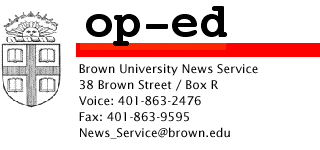

|
Distributed October 2, 2000 Copyright ©2000 by David Estlund |
Op-Ed Editor: Janet Kerlin About 790 Words | |
|
David Estlund Should we associate with the Scouts? People who find the Boy Scouts’ practice of excluding gay people morally offensive should make their views clear through their own free expression and non-association. The Supreme Court’s decision settles a legal dispute in favor of the Boy Scouts. The court of public opinion remains open. “It’s a free country” is one of the phrases that echoes from the playgrounds and Boy Scout camp-outs of my youth. The kid cutting in line seemed to think that in a democracy he could do whatever he wanted. Grown-ups know our freedom depends on laws, and that some laws restricting expression (libel, conspiracy) are legitimate under the First Amendment. On the other hand, laws restricting the expression of a viewpoint are only permitted under narrow circumstances, and this is indeed part of what we mean when we say it’s a free country. Now the Boy Scouts say that part of their public message is a moral condemnation of homosexuality. This comes as a surprise to many, including most Scouts, but the Supreme Court has argued (in Boy Scouts of America et al. v. Dale) that for legal purposes we ought to take them at their word. The court has also agreed with Boy Scouts that having leaders or members who are publicly identified as homosexual would be a burden on their freedom of expression, specifically their freedom of “expressive association.” The Boy Scouts’ contentions are not entirely plausible. When I was a Scout in the 1970s it never occurred to me that I was vowing to be (what I anyway am) heterosexual when I vowed to be “morally straight” or “clean,” as Boy Scouts now claim. They might have held the official view that homosexuality was wrong and so incompatible with being “morally straight.” If they wanted it to be part of their message they could easily have added an unambiguous 13th Boy Scout Law (“thrifty, brave, clean, reverent, heterosexual”). In any case, how would that message be damaged by granting membership to gays? For comparison, one of the 12 laws that Scouts promise to uphold is a requirement to be helpful by doing “a good turn daily,” and so there are many Scouts and leaders who have manifestly fallen short. Has this undermined the group’s message that young men ought to be helpful? Probably not. I will not enroll my children in a group whose membership is organized around the vow not to be homosexual. In a familiar confusion, some people will say I am ignoring the court’s vindication of Boy Scouts and their freedom to express their anti-homosexual views. But, as the court clearly said, this legal decision about freedom of expressive association says nothing about whether the message or the group is morally decent. Exclusion of gay members is an inhumane way to for the Boys Scouts to hone their message, whatever their legal rights may be. Instead of clearly telling children, parents and prospective leaders of this anti-gay position, letting people decide whether to join on those terms, Boy Scouts have chosen to bury their anti-gay message in the sweeping language of cleanliness and moral rectitude. They have made it impossible for someone to know what they are supposed to be vowing when they take the oaths and recite the laws. One joins the Scouts at the risk that, for example, there are more specific religious intentions behind the promise to be reverent or to do your duty to God. And what exactly does the promise of “loyalty” mean, and are you sure you want to vow what they want you to vow? Such questions would have seemed paranoid before the Boy Scouts explicitly stated that by “morally straight,” they meant heterosexual. Why would any gay person want to join a group that has an anti-gay view? The possible answers are summarized for me in the fact that I remained a Scout even as I uncomfortably tried to reconcile my atheism with the Scout’s promise to be “reverent.” People who find these practices morally offensive should make their views clear through their own free expression and non-association. The court’s decision settles a legal dispute in favor of the Boy Scouts. The court of public opinion remains open, and as both Boy Scouts and the court have emphasized, association is itself expressive. For some families and communities, disassociation from Boy Scouts will take some effort, and alternatives need to be cultivated, but these steps are an important part of our public debate on this moral issue. It’s a free country. Be prepared. David Estlund is an associate professor of philosophy at Brown University. ##### | ||